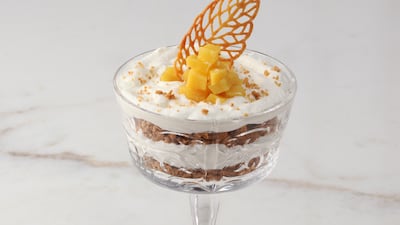For anyone who has been to India, the term “Indian food” can seem like a weak way to describe a culinary tradition that spans 28 vast states and a population of almost 1.4 billion people.
Nonetheless, dealing with this blanket term is the lot of chefs around the world who serve much-loved Indian food to foreign customers, most of whom will know little about the origins, ingredients and cooking methods that make the meals they enjoy so much.
The Crossing, which opened at the beginning of the year in The H Dubai, is a little different. Rather than operate in spite of this broad label, it uses it as something of a mission statement. It seeks to bring all the main cuisines of India to the dining table in a modern, simple manner.
What to expect and where to sit
The decor matches the restaurant's lofty ambition. It is open and relaxed, but grand at the same time, with tables laid ready for a simple meal or larger tasting menu. The circular ones in the middle are best for the full spectacle.
The chef behind the concept is Ankur Chakraborty. He credits much of his approach to a well-travelled upbringing — hailing from Varanasi, one of the oldest living cities of the world, he spent most of his youth in Delhi. Perhaps most importantly of all, his father worked with the Indian Railways.
“I was fortunate enough to travel around India with him due to his work,” Chakraborty says. As a result, his cooking style is “inclusive”, with the best dry ingredients coming from India, and fresh ones from as close to the restaurant as possible.
The menu
The Crossing prides itself on serving food from Rajput kitchens, North-east India, and the country's massive coastline, as well as shining a spotlight on the foreign influences that have found their way into the country's cuisine, from places as far as the Caribbean, Portugal, France and the UK.
The best way to see how the restaurant tackles this grand task is the tasting menus, the largest of which costs Dh499 ($136). All six dishes are good, but the paneer tikka stands out, as does the rib-eye steak.
Beef is less common on Indian restaurant menus, and it was particularly memorable to try the chef’s take, with red chillies and lal maas curry. The chaat was good enough, but in a restaurant that takes originality seriously, it stuck out somewhat for its conformity.
There is also an expansive a la carte menu, from which meat lovers would do well to order the lamb shank, representing the “cultural crossings from Turkmenistan all the way to India”.
For vegetarians, the kathal comes highly recommended. It is a slow-cooked jackfruit curry with shallots, cooked in chettiar style — popular in the South Indian state of Tamil Nadu. Jackfruit also finds its way on the dessert menu in the form of serradura, a Goan delicacy made by combining the fruit with cream cheese, milk and biscuit crumb.
For seafood lovers, chef Chakraborty recommends the bottle masala sea bass. It gets its name from the spices that are stored in glass bottles after being pounded by hand and dried in the sun.

The menu lists the hybrid origins of each dish. The Kalimpong dumplings, for example, have their roots in Darjeeling and North Bengal, while the gunpowder prawns hail from both erstwhile Bombay and Madras. The Middle East is referenced on the menu through dishes such as pomegranate raita, mutton pulav and lamb chops.
A chat with the chef
Even in such a diverse menu, the chef is keen to stress common principles. This is particularly true of one ingredient that he says plays a critical role in all Indian styles of cooking: time. Whether it is the patience to develop a new recipe or slow-cooking, he believes: “Time is the most important ingredient to be used in our subcontinent's cooking, be it for a korma or a simple dal. Low-temperature slow cooking allows the complex spices to mix well and mature.”
The same should go for anyone who wants to get a sense of what The Crossing is attempting. Take an evening to sample the tasting menu to see what the philosophy is all about. The restaurant has not chosen an easy task, but the effort it makes is a worthy one.
Price point and contact information
Tasting menus range from Dh299 to Dh499; a la carte offerings are from Dh45 for smaller plates to Dh155 for larger items on the grill menu.
The Crossing is located on the ground floor of The H Dubai in the Trade Centre area. Reservations can be made by contacting info@crossingtherestaurant.com or calling 04 491 9695.
This review was conducted at the invitation of the restaurant


